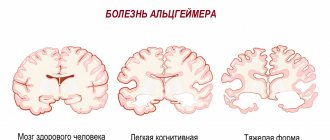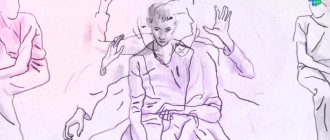What is correct to call psychosomatics?
The word “psychosomatics” is often perceived as an abbreviation of the phrase “psychosomatic illness”. When we talk about psychosomatics, it seems to automatically mean something painful, indicating a disorder. Not only is this a violation, but it also comes with the prefix “psycho-,” which brings an additional negative connotation. It so happened that there are symptoms that are taken seriously - somatic, with which people can sympathize, and there are mental ones - fatigue, bad mood, depression, irritability, inability to concentrate - which, without an obvious physiological reason, supposedly indicate weakness and laziness, some kind of " fake”, “far-fetched”, some kind of slyness.
Perhaps attitudes would be different if it were widely accepted that “psychosomatics” is the way we are all wired. A psychosomatic person. Homo psychosomaticus. Our physical is inextricably linked with our mental: what mood we are in, what we have the strength and desires for largely depends on our somatic state. During destructive, atrophic processes of the brain, the human psyche changes - his mood, his interests, cognitive abilities, emotional reactions, behavior. But the opposite effect is also true. Subjectively experienced discomfort, tension, despondency, or, on the contrary, joy, inspiration, emotional uplift, are reflected in the functioning of the body. These connections always exist, and do not appear only with some special “psychosomatic diseases”. For each person, his psyche and body are not separate, but constitute a single “psychosomatics”, which implies interdependence and mutual influence of the mental and physiological in a person.
In a narrow, special sense, psychosomatics in medicine and psychology is the field of study of the influence of mental disorders on the occurrence and development of diagnosable bodily pathology, as well as the connection and influence of somatic diseases on the occurrence and course of mental disorders. The history of psychotherapy is the history of understanding psychosomatic disorders. In an 1890 article entitled “Psychical Treatment,” S. Freud describes people suffering from somatic illnesses as follows:
The group of these patients attracts attention with the richness and diversity of the disease picture; they cannot work mentally due to headaches or impaired attention, their eyes hurt when reading, their legs get tired when walking <…> their digestion is upset by unpleasant sensations <...> They can have all these ailments at the same time, or alternately, or only a certain selection of them <…> At the same time, the signs of the disease are often changeable, they replace and replace each other <…> Also, illnesses suddenly leave him with a radical change in living conditions.
Personality characteristics in codependency
Codependents often downplay the extent of their problem and sometimes only a specialist can determine the true state of affairs. However, according to personal characteristics, several standard characteristics can be distinguished:
1. Low self-esteem
One of the main characteristics on which all others depend. Codependents often use the words “should, should” and their consciousness is always directed outward, which is associated with the desire to help others.
2. The desire to control someone else's life
The need to bring order to the situation in the family by any means: advice, complaints, threats or persuasion. They often resort to instilling feelings of guilt or display excessive authority. If an addict breaks down, they consider it a personal defeat.
3. The desire to save others
Codependents sleep poorly, do not take care of their diet and health, and cannot determine their own needs. At the same time, the desire to help the addict on their own fails every time, which leads to a feeling of need and irreplaceability.
4. Experiencing negative emotions
Most of the actions of codependents are motivated by a feeling of fear. It is this feeling that forms the basis of any form of addiction. Close people are afraid to face reality, to be abandoned, to lose control over their lives, and much more.
A constant feeling of fear interferes with them and leads to such a state as rigidity or inflexibility of both soul and body. In addition to fear, codependents often encounter feelings such as anxiety, guilt, shame, resentment, anger, self-pity, and despair. A person protects himself with such toxic emotions.
5. Denial of the problem
Codependents deny the real situation, prefer to minimize the problem or repress it. They often pretend that nothing special is happening; they may even deny the direct fact of drug intoxication. If something said supports their illusion, then they willingly believe it. Self-deception leads to spiritual degradation and prevents you from asking for help for yourself, which also has a detrimental effect on the addiction of an alcoholic or drug addict.
6. Psychosomatic illnesses
Constant stress provokes physical illnesses. Codependents often suffer from arrhythmia, tachycardia or headaches, have problems with the gastrointestinal tract, even open ulcers, and others.
Codependents try to control someone else's life contrary to their own needs, which ultimately leads to disruptions in the body. The presence of psychosomatic diseases indicates a serious course of codependency and the need for recovery. You won’t be able to relieve symptoms on your own, so to cope with codependency, you need the help of psychologists.
7. Spiritual crisis
The codependent relationship with himself, with family and society deteriorates and is replaced by distorted interaction with an alcoholic or drug addict in the family. All attention and energy are devoted to him, which affects the quality of his entire life.
Codependency can be dealt with through psychotherapy. You can achieve positive results during individual or group work with a psychologist or after completing special courses. This process takes time and goes through several stages on the way to a free life.
How often does this happen?
We can safely say that there is not a single person who has not encountered psychosomatic phenomena. The state before an important event - an interview, an exam - for many people is accompanied by anxiety, excitement and a number of manifestations from the body: “stomach twisting”, nausea, sweating, palpitations and similar phenomena, usually combined into the group of psycho-vegetative symptoms. The first and main difference between “psychosomatic disorders” and “normal psychosomatics” in the given example is that unpleasant sensations in the body, dysfunction of a person’s organs are not associated with anything happening in his life, with some kind of excitement or experience. Symptoms are perceived as something existing in itself, something that has arisen due to nothing, some kind of problem in the body. And if this is felt in the body, then it means that the reason for this is some kind of bodily, biological, one that can be found and eliminated.
Are there frequent cases when people go to the doctor with complaints of a feeling of palpitations, interruptions in the heart, pressing or piercing pains, a feeling of fatigue, exhaustion, darkening in the eyes, dizziness, a feeling of shortness of breath, internal trembling, a feeling of coldness, sweating, headaches ? According to statistics, every fifth patient who comes to the clinic suffers from a psychosomatic disorder, and before contacting a psychotherapist, these “patients who have nothing,” “doctor-goers” are examined and treated by doctors of various specialties from 1 to 3 years. The feeling that almost always accompanies the symptoms pushes for new examinations and a search for the cause - this is anxiety, concern for one’s health, turning into fear of an undiagnosed life-threatening disease.
How to get rid of psychosomatic illnesses
Author: Psychologist Karina Savinova
Updated: 03/12/2021
There is a whole group of ailments that arise “from the head” and are not always associated with a disease of a particular organ. They are called psychosomatic disorders.
Source: unsplash.com
Their manifestations significantly worsen the quality of life and force one to constantly focus on the symptoms. A person begins to meet with friends less often, avoids interesting meetings and events, and withdraws into himself.
In search of a diagnosis, he spends huge sums on examinations and ineffective treatment. Hypochondria gradually develops. Due to a lack of understanding on the part of loved ones, conflicts arise in the family. All this can lead to severe depression.
How to find out if you have psychosomatic disorders:
Check if you have the following symptoms:
- heart pain without physical activity;
- heaviness in the body and limbs;
- dizziness;
- pain in the abdomen and intestines;
- increased or decreased appetite;
- back pain;
- blood pressure surges;
- pain in the temporal region;
- frequent heartbeat or heart failure;
- difficulty swallowing and a feeling of a “lump” in the throat;
- loss of voice during excitement;
- pain in the neck and head;
- shortness of breath, desire to take a deep breath;
- feeling of numbness and tingling in the hands;
- painful cramps in the calf muscles;
- impotence, weakness, fatigue;
- nasal congestion;
- short-term visual impairment;
- hot flashes or chills;
- psychogenic nausea;
- sleep disorders;
- excessive urination;
- menstrual irregularities;
- problems in intimate life;
- anxiety, increased anxiety;
- depressed mood;
- irritability.
For additional help and support regarding your concerns, speak with a licensed professional.
Find a specialist We will select the best specialist for you
Types of psychosomatic diseases
Based on their symptoms, they can be divided into several groups. As a rule, each episode of the disease is short-lived. Important: a psychosomatic disorder with such symptoms can be diagnosed only after a complete medical examination and exclusion of neurological diseases.
Conversion symptoms Conversion disorder often develops suddenly, after severe stress. The following signs may appear: trembling, disturbances in consciousness, abnormal positioning of limbs, loss of coordination or balance, double vision, paralysis of arms or legs, loss of sensation, seizures, blindness, unresponsiveness to stimuli, deafness, difficulty swallowing, urinary retention, pain phenomena, sensation of a lump in the throat, loss of voice, psychogenic vomiting.
Functional syndromes In this case, the patient does not find pathological changes in the organs. But the symptoms say otherwise. A person may have many complaints, different and often vague. They disguise themselves as diseases of the gastrointestinal tract, cardiovascular system, respiratory system, genitourinary system, and musculoskeletal system. Psychogenic pain in the heart, constipation and diarrhea, tachycardia, bronchial asthma, disturbances in intimate life and other symptoms may occur.
Psychomatosis Here the body directly reacts to what is going on in the head. Changes and pathological disorders occur in organs. The first manifestations of psychomatosis can appear at any age, but more often occur in early adolescence.
This group includes the following diseases:
- essential hypertension;
- bronchial asthma;
- ulcerative colitis;
- peptic ulcer of the stomach and duodenum;
- obesity;
- psychosomatic thyrotoxicosis;
- neurodermatitis;
- rheumatoid arthritis;
- cardiac ischemia;
- diabetes mellitus type 2;
- somatoform behavior disorders.
You can also add radiculitis, chronic pancreatitis, gallbladder dyskinesia, intestinal colic, irritable bowel syndrome, vitiligo, psoriasis, migraine, infertility in the absence of pathology of the reproductive system.
Source: unsplash.com
Consequences of psychosomatic diseases
If the disorder is not treated, the following may occur:
- functional changes and disturbances in the functioning of organs and systems;
- the need for constant drug treatment;
- decreased quality of life;
- limitation of physical and social activity;
- deterioration of psychological well-being.
Why do psychosomatic illnesses occur?
There are many different myths about the causes of such disorders. For example, that adenoids appear in children because they are not loved enough. And problems with gall occur in those who are angry a lot. In fact, research does not support such theories. However, there is definitely a connection with emotions.
The causes of psychosomatic illness can be:
- internal conflict;
- the result of psychological trauma;
- hereditary predisposition;
- suggestion from another person;
- identifying oneself with a person who suffers from a similar disease;
- self-punishment due to guilt;
- conditional benefit.
Source: unsplash.com
Diagnostics
Only a doctor can make a true diagnosis. Unfortunately, in our country there are still few specialists who are well versed in psychosomatic diseases. Often doctors simply dismiss such patients and advise them to be less nervous.
So, you can suspect psychosomatic illnesses if:
- A specific symptom is observed for more than six months;
- The disease developed against the background of a traumatic situation;
- The patient is very worried about his health and spends a lot of time and energy on it.
- Symptomatic drug treatment does not help or quickly ceases to work.
- Exacerbations of the disease depend on psychogenic factors.
- Serious organic pathologies are completely excluded based on tests and examination.
- Relapses occur frequently.
How to treat psychosomatic illnesses
Traditional treatment for psychosomatic diseases may be ineffective. It often leads to drug dependence and side effects. Or it doesn't help at all.
If organic pathology is completely excluded, you need to do the following:
- Change your lifestyle. For the treatment of psychosomatic diseases, healthy sleep, work and rest schedule, regular physical activity and proper nutrition are important. Don't start abruptly, form good habits gradually. For example, introduce 10 minutes of sports into your life. Download applications to your smartphone and set reminders. As soon as the habit is formed, increase the time of practice.
- Also gradually reduce the amount of sugar and junk foods in your diet. Shift your bedtime, put off everything. And don’t forget to get plenty of rest – preferably without the Internet or TV. It is also recommended to reduce the duration of use of electronic devices.
- Look for something you love. When a person is truly passionate, he devotes less time to his illness. And over time, you may be surprised to find that the symptoms have become weaker and occur less frequently.
- Solve the problem once and for all. A specialist is needed for a complete cure. In the case of psychosomatic illnesses, a qualified psychologist can help. He will find the causes of the disease and work out everything that worries the patient. The specialist will teach you how to effectively manage strong negative emotions so that psychosomatic symptoms do not return later. It will help you find your life’s work, which will distract you from soul-searching and bring peace of mind.
Source: unsplash.com
How to choose a specialist
Finding someone you can trust with your secrets and health can be difficult. I would like this to be a proven psychologist who has extensive experience working with psychosomatic diseases. Also, many people are uncomfortable with face-to-face sessions or frequent phone calls.
The Psy-Psy service offers a modern consultation format and individual selection of a psychologist. You can write to a specialist at any time via instant messenger - WhatsApp, Telegram, Skype or Viber. The psychologist regularly provides detailed consultation. Conducts weekly sessions via video conference at a time convenient for the client.
To get started, you just need to complete a short survey. The system will select a psychologist from a database of 73 specialists with higher education and confirmed qualifications. Average work experience is 10 years. Everything is anonymous and confidential.
For additional help and support regarding your concerns, speak with a licensed professional.
Find a specialist We will select the best specialist for you
The information on this page is not intended to be a substitute for diagnosis, treatment, or informed professional advice. You should not take any action or avoid any action without consulting a qualified mental health professional. For more information, please read our terms of use.
SHARE
Do you agree with the statement that all diseases are caused by nerves?
No, I don't agree. This is a very organocentric statement, that is, from an approach that, if it connects bodily symptoms with the psyche, it is only in the sense that the psyche is primarily the brain, the nervous system, and its main characteristics are excitability and conductivity. The nervous system is overexcited—a person is “on edge.”
You need to cool it down, remove the excitement, and everything will be fine. This understanding gives rise to the idea of psychotherapy as some kind of relaxation techniques: watching the sea on TV, listening to pleasant ethno music. The psyche is still not nerves. In the article by S. Freud, which I have already referred to, let me remind you, an article from 1890, there are such interesting lines:
Medical research finally came to the conclusion that such persons could not be considered and treated as suffering from stomach disease or eye disease, etc., but that in their case it must be a suffering of the entire nervous system. However, examination of the brain and nerves of such patients has so far not revealed any obvious changes, and some features of the disease picture do not even give reason to expect that someday, using more subtle research methods, it will be possible to identify changes that could explain the disease. These conditions were called nervousness (neurasthenia, hysteria) and were characterized as simply a “functional” illness of the nervous system.
And now, after so many years, we seem to still believe in the organic nature of diseases, or in some specific organ neuroses: “cardioneurosis”, “stomach neurosis”, etc., that is, we are trying to build some linear dependencies at the structural and biochemical level. Of course, the integrity of brain structures and electrochemical activity are conditions for the existence of the psyche, but it cannot be said that it is these indicators that determine the content of the psyche (ideas, thoughts, feelings). By getting on the nerves, you can ensure that some ideas are accompanied by less anxiety, it becomes possible to distract yourself from obsessive, absorbing thoughts, achieve what in professional language is called “deactualization of experiences,” but not change their content.
How our psyche works
First, I’ll briefly tell you how our psyche works.
Every day of our lives we encounter different events - pleasant and unpleasant. From the bright sun in the window or sour milk in the refrigerator to a flu-like spouse or an angry boss.
Our psyche responds to these events in three different ways.
The simplest and healthiest way is to express feelings appropriate to the situation. We rejoice in the sun, are upset that the milk has gone sour, sympathize with our spouse, are afraid of our boss or are angry with him. Yes, all this happened to us, but this is not a disaster, we will see what happened, experience this or that feeling and move on.
The second way is through action. For example, we discover that the milk has gone sour and we understand that our favorite coffee will not be available today. And at this particular moment - for some reason not entirely clear to us - the lack of milk seems like a huge tragedy. Without really realizing what is happening to us, we grab the unfortunate package and throw it out of the window. Or we pour it on the head of the spouse who did not close the bottle properly. Or we run out of the apartment in disarrayed feelings and with the feeling that the whole world is against us.
I think such stories have happened to everyone. It seems like a petty reason, but the reaction is as if we came face to face with a dangerous predator, and we need to attack it or at least run away as far as possible.
The third method is anesthesia. In this case, we are also overwhelmed by affect, but unlike the previous version, this affect does not find a way out through aggression or flight, but remains within us. We are just standing in front of the refrigerator with this bottle of sour milk and realizing that everything is useless and we want to go out the window.
That is, aggression in this case is directed not at external objects, but at ourselves - at our psyche and our body. Repeated chains of reactions of the third type to various life events are the basis for the development of psychosomatic diseases.
What is the difference between psychosomatics and hypochondria?
Psychosomatics is both a holistic approach to the connection between mental and physical phenomena, and a special area of research in medicine and psychology that studies the influence of mental factors on the occurrence and course of somatic disorders. Hypochondria is the name of a condition in which the content of the psyche consists of thoughts and feelings associated with the search for symptoms of a somatic disease, the interpretation of bodily sensations as signs of illness, when a person lives by what is being treated. By the way, it is interesting to note that in addition to searching for diseases and treating them, there are also conditions that can be called “hypochondria of health,” when a person subordinates all his activities to the interests of maintaining health, strengthening it, and also preventing the development of possible painful conditions.
This is, one might say, an extremely valuable healthy lifestyle. Although we are, of course, talking about one thing. What, for example, does a person concerned about cleanliness do? Searching for and eliminating the slightest signs of dirt.
What is meant by the term apathy?
Translated from Greek, apathy means dispassion (ἀ is the negation of “without”, and πάθος means passion, excitement). In the scientific understanding, apathy is a psycho-emotional state, the main manifestations of which are indifference, indifference, detachment from current events, lack of emotions and inaction. People most often interpret apathy as laziness, i.e. reluctance to do or engage in anything. In fact, people only take into account external manifestations of apathy that directly concern them and often irritate those around them. Who would like a creature at home or at work that is not interested in anything, inactive and detached from worries? And this while you are making incredible efforts to keep your family, business, and working for yourself and “that guy” afloat? But everything is not so simple, apathy towards life is not a fault, but a misfortune for a person who is gradually entering this state. Many scientists consider apathy as the initial stage of depression, which can ultimately lead to catastrophic changes in a person's personality. Without professional psychological help, it is quite difficult and almost impossible to restore interest in life to an apathetic person. Therefore, treat the laziness of a loved one as a serious violation of his psycho-emotional state and seek help from specialists as early as possible.
It must be remembered that apathy can also be observed in healthy people, for example, it can be a special character trait in a melancholic or aging person. In these cases, reduced social and psycho-emotional activity can be considered the norm. First of all, the unexpected and inexplicable passivity of a recently active, sociable and hardworking person should be alarming. According to ICD-10, apathy is classified as “symptoms and signs of deviation from the norm in the cognitive sphere, behavior and emotional state.”
What diseases can you “invent” for yourself? Which of these is the most common - based on your experience?
Most often, people begin to think about cardiovascular pathology, cerebrovascular accidents, and neoplasms in internal organs. The longer they are examined, the more medical specialties are replaced along their diagnostic path, the more suspicions arise about difficult-to-recognize, rare diseases that may not be detected due to insufficient qualifications of local specialists. And surveys continue in regional centers, capitals, and abroad.
What are the most typical symptoms of apathy?
Symptoms of the state of apathy can be of varying degrees of intensity - from a mild decrease in the emotional background to complete lack of will (abulia), adynamia, refusal to eat and even fulfill natural physiological needs. Somatic manifestations of apathy are mild, except in cases where it is a consequence of an exacerbation of chronic ailments or an underlying disease. Then the entire symptom complex corresponds to the symptoms of the underlying disease.
External symptoms of an apathetic state are: • Poor facial expressions. • Automaticity in movements. • Monotonous speech. • Slow reactions, including responses to questions. • Reduced sociability. • Loss of interest in work and active recreation. At the same time, the person continues to fulfill his duties - go to work, communicate with friends, work with children, i.e. perform their social functions, but all this is rather out of habit, without inner desire and pleasure. Interest in life gradually fades away, and a person does not have the strength and mental energy to overcome laziness and growing melancholy. By the way, the phenomenon of melancholy in the modern interpretation corresponds to a state of depression, although at the everyday level it is often understood as apathy. Mental symptoms are much more significant and include the following symptoms: • Weakness to the point of complete impotence. • Quick fatigue even from the simplest actions. • Feeling of constant fatigue, when even doing nothing becomes tiring. • Decreased or complete lack of interest in previously favorite activities and hobbies, including games and entertainment. • Depressed or depressed mood. • Closedness, desire for solitude. • Severe drowsiness even after a full night's sleep. • Discomfort in sensations with a predominance of gloomy thoughts, hopelessness and depression. • Decreased appetite, sometimes irritation from the smell, taste and appearance of certain foods or dishes. • Problems with memory and concentration. • Lack of initiative in all areas of life, even in sexual relationships.
It is important not to confuse low mood in a healthy person with symptoms of apathy. If in the first case the deterioration in mood is of a short, transient nature, then the apathetic state is permanent or predominant. If it lasts more than 2 weeks, it’s time to sound the alarm. Moreover, it is simply impossible not to notice changes in a person during apathy, they are so striking. The feeling is that all vital forces are leaving a person. The patient believes that nothing depends on him in this life, doing something and fighting is pointless, all his attempts to solve something or achieve something are doomed to failure. So why try, it’s better to hide from reality, do nothing and not worry about anything. Such psycho-emotional departure from life can ultimately lead to physical decline of body functions and premature death. After all, life is movement in any form - emotional and behavioral reactions, physical activity, normal metabolism with a balance of energy expenditure and synthesis. All this is movement at different levels - social, organismal and molecular. And vice versa, apathy is adynamia in any location, and in extremely advanced cases it is the coding of the body for self-destruction.
Is there a type of people most susceptible to psychosomatic disorders (risk group)?
This question can be answered with the formula: “the less psyche, the more somatics.” The less understanding of the motives of my own actions and choices, the less understanding of what influences me, what feelings I am trying to avoid, how I do not want to feel, the more likely somatic symptoms are.
It is interesting that many childhood and adolescent diseases are psychosomatic, that is, with a pronounced, noticeable influence of the mental state on their occurrence and course. Thus, selective studies of children and adolescents in a somatic hospital showed that in 53% of cases, somatic disorders are caused by mental (depressive) disorders. Parents themselves often notice the connection between conflicting, tense relationships in the family and the frequency of illnesses in the child. A child has even less idea than an adult what motivates him, what ideas and whose opinion determines his feelings, his good or bad mood. When a child says “I feel bad,” the parents’ first counter question will most likely direct him to a “somatic answer”: “What hurts you, where does it hurt?” Although, perhaps, what the child is trying to say concerns a general, vague feeling of displeasure, perhaps this is some kind of mental “bad”, and not a symptom of a physical illness.
Tables of psychological causes of various diseases
Does the disease depend on the type of affect? Can we say that anger provokes gastrointestinal ulcers, for example, and fear provokes chronic tonsillitis? Do the classifications of psychosomatic diseases by Louise Hay, Vladimir Zhikaretsev, etc. make sense?
No, all this information has no scientific basis.
In the case of psychosomatics, the principle “Where it is thin, it breaks” works. If there is a history of depression in the family, the child may be prone to depression. If there are gastrointestinal diseases, he is already born with a vulnerable intestines or stomach. If a person is an athlete by profession, then his way of coping with affects may be through sports injuries. And so on.
Therefore, in each specific case, psychologists study the history of a particular person and look for affects that are difficult for them to experience.
How to relieve muscle tension during neurosis with massage
A nervous disorder requires careful treatment, so the massage should not be intense. Light rubbing and kneading is enough. The main focus is on the area of the neck, shoulders and head, since it is there that muscle tension during neurosis manifests itself most clearly. Acupressure techniques also have a relaxing effect.
The massage therapist works the tense muscles of the shoulders and neck, gradually moving up to the head, then acts on points located at the temples, in the area of the eye sockets, and on the forehead. The massage ends with circular movements of the hands over the scalp. The patient's discomfort during the procedure is a signal to stop it. The relaxing effect of a massage is enhanced when combined with a calm environment, quiet music and pleasant aromas.
Patients can learn self-massage and acupressure techniques to help themselves at home when attacks of neurosis occur.
The essence of the theory
Psychosomatics is a complex of diseases, the causes of which lie in long-term psychological disorders that developed in a person earlier. One should not think that such diseases can be cured by simply influencing the patient’s consciousness and thoughts. They need very complex and lengthy treatment.
The author of the theory that examines the development of psychosomatics in people is Louise Hay. She compiled the most complete list of various pathologies that arise under the influence of psychological causes. She also gave the most valuable advice on their healing. The researcher relied on medical knowledge, folk wisdom and her own experience.
Louise Hay
Subsequently, she wrote several books, which became real guides to the inner world for people living in all corners of the globe.
L. Hay thoroughly studied the psychosomatics of the body. Based on her research, she developed the most effective statements, which she designated as “affirmations.” They effectively allow a person to believe in himself and thereby bring about self-healing.










